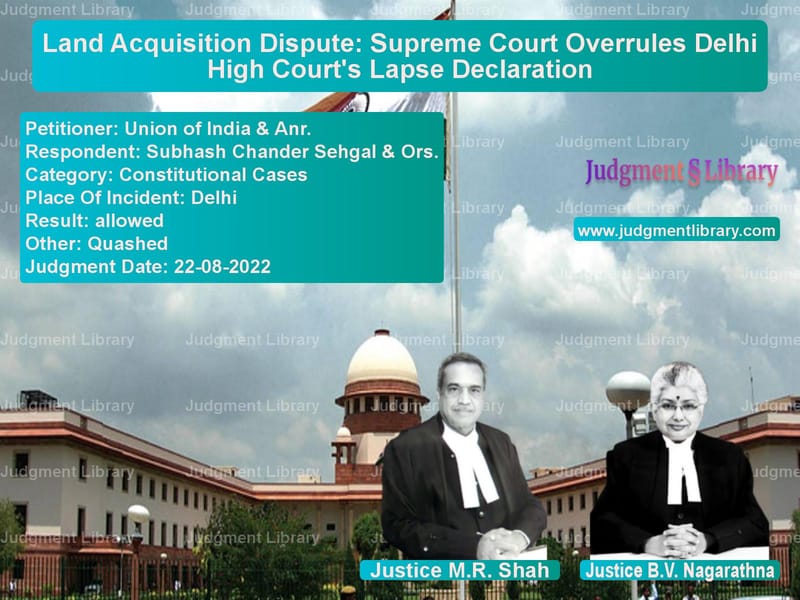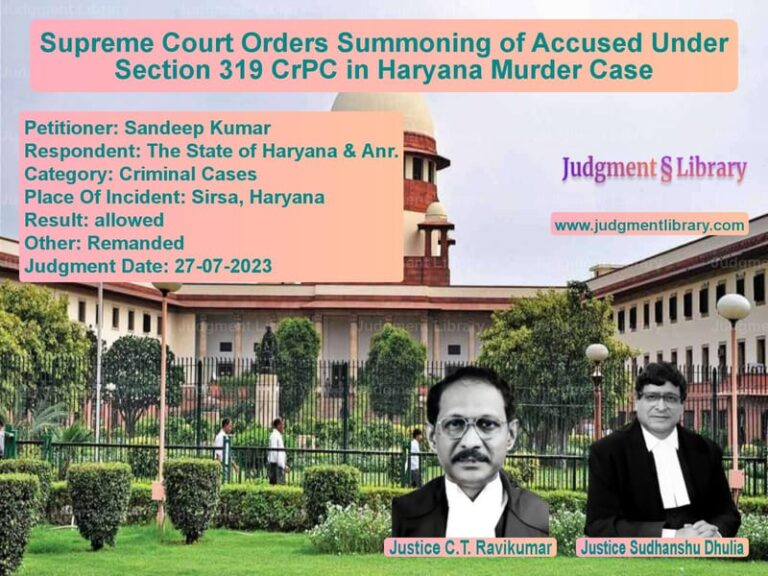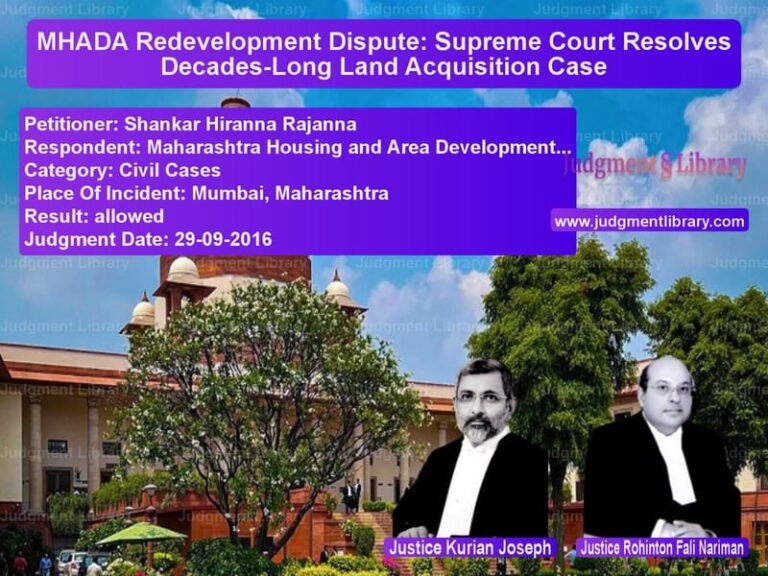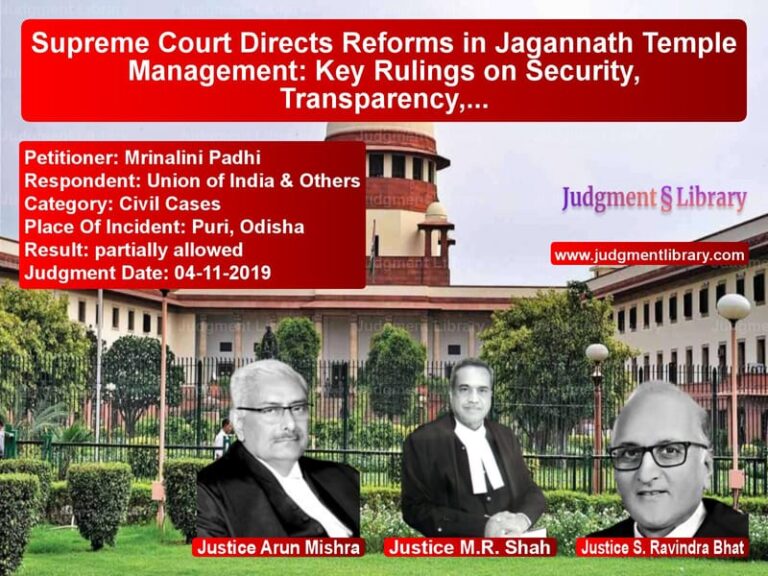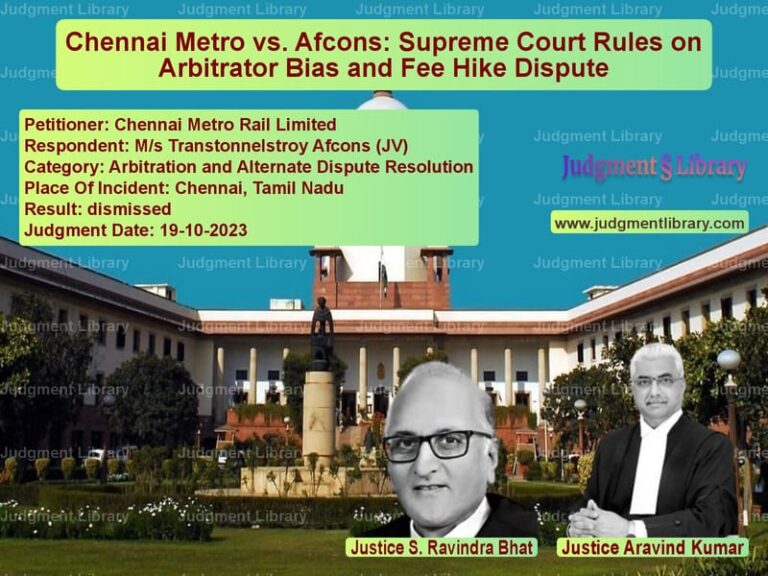Land Acquisition Dispute: Supreme Court Overrules Delhi High Court’s Lapse Declaration
The case of Union of India & Anr. vs. Subhash Chander Sehgal & Ors. revolved around the validity of land acquisition proceedings initiated under the Land Acquisition Act, 1894. The Supreme Court was called upon to decide whether the acquisition proceedings had lapsed under Section 24(2) of the Right to Fair Compensation and Transparency in Land Acquisition, Rehabilitation and Resettlement Act, 2013 (LARR Act, 2013).
Background of the Case
The land in question was acquired by the government in 1987 for the purpose of a park, which was later developed by the East Delhi Municipal Corporation. Possession of the land was taken in 1987, but the compensation had not been disbursed to the landowners. The respondents (landowners) filed a writ petition before the Delhi High Court, seeking a declaration that the acquisition proceedings had lapsed under Section 24(2) of the LARR Act, 2013, since compensation had not been paid.
The Delhi High Court, relying on earlier Supreme Court decisions in Pune Municipal Corporation vs. Harakchand Misirimal Solanki and Sree Balaji Nagar Residential Association vs. State of Tamil Nadu, held that the acquisition proceedings had lapsed and ordered compensation to be paid under the LARR Act, 2013. The Union of India challenged this ruling before the Supreme Court.
Supreme Court’s Review of Legal Precedents
The Supreme Court noted that the decisions in Pune Municipal Corporation and Sree Balaji Nagar Residential Association had been subsequently overruled by a Constitution Bench in Indore Development Authority vs. Manoharlal & Ors. (2020). In this case, the Court clarified that possession of land and payment of compensation are separate conditions, and the mere non-payment of compensation does not automatically result in the lapse of acquisition proceedings.
Key Observations from Indore Development Authority Case
- Section 24(2) of the LARR Act, 2013 applies only if both possession has not been taken and compensation has not been paid for a period of five years or more before January 1, 2014.
- If either possession has been taken or compensation has been paid, the acquisition does not lapse.
- Deposit of compensation in a government treasury amounts to a valid discharge of the government’s obligation, even if the landowners have not withdrawn the amount.
Arguments Presented
Petitioner (Union of India) Arguments
- The government argued that possession of the land had already been taken in 1987, and it was being used as a park, thereby negating any claim of lapse.
- They contended that as per the Indore Development Authority ruling, the High Court’s decision was erroneous because possession had already been transferred.
- The government asserted that the landowners were only entitled to compensation under the Land Acquisition Act, 1894, not under the LARR Act, 2013.
Respondent (Landowners) Arguments
- The landowners argued that the failure to pay compensation for more than two decades rendered the acquisition proceedings void.
- They relied on the High Court’s ruling that compensation had to be paid under the LARR Act, 2013, due to the lapse of acquisition.
- They claimed that merely taking possession of the land was not sufficient if compensation had not been paid.
Supreme Court’s Analysis and Judgment
The Supreme Court, relying on the Indore Development Authority ruling, held that the acquisition proceedings had not lapsed. The Court reasoned that since possession had been taken in 1987, the question of lapse under Section 24(2) of the LARR Act, 2013 did not arise.
Key Observations by the Supreme Court
- The Court reaffirmed that possession is a key determinant in land acquisition cases. Since possession had already been transferred to the municipal corporation, the proceedings remained valid.
- It held that the landowners were not entitled to claim lapse under the LARR Act, 2013, and were only eligible for compensation under the Land Acquisition Act, 1894.
- The Court emphasized that its Constitution Bench ruling in Indore Development Authority had settled the interpretation of Section 24(2), rendering the High Court’s decision incorrect.
Key Court Statement
“Once it is held that there is no lapse of acquisition proceedings under Section 24(2) of the 2013 Act, the land which has stood vested with the appellant continues to do so. Also, there is no question of payment of any compensation to the writ petitioners under the 2013 Act.”
Final Judgment
- The Supreme Court set aside the Delhi High Court’s ruling, thereby upholding the validity of the land acquisition proceedings.
- It ruled that the landowners were only entitled to compensation under the Land Acquisition Act, 1894, as per Award No. 102/1986-87.
- The Court dismissed the landowners’ claim for higher compensation under the LARR Act, 2013.
- The appeal filed by the Union of India was allowed, and the writ petition filed by the landowners was dismissed.
Implications of the Judgment
This ruling has significant implications for land acquisition cases:
- It reinforces that once possession has been taken, the acquisition remains valid, irrespective of delays in compensation payment.
- It clarifies the correct interpretation of Section 24(2) of the LARR Act, 2013, ensuring consistency in future land acquisition disputes.
- It protects public projects from unnecessary legal challenges based on technical lapses in compensation disbursement.
- It ensures that landowners cannot misuse procedural gaps to claim enhanced compensation under newer laws.
Conclusion
The Supreme Court’s decision in this case upholds the integrity of land acquisition proceedings while ensuring that landowners receive compensation as per the law applicable at the time of acquisition. By overruling the Delhi High Court’s judgment, the ruling provides much-needed clarity on the application of the LARR Act, 2013, preventing misuse of its provisions to challenge long-settled acquisitions. This judgment sets a crucial precedent for future disputes regarding lapses in land acquisition proceedings.
Petitioner Name: Union of India & Anr..Respondent Name: Subhash Chander Sehgal & Ors..Judgment By: Justice M.R. Shah, Justice B.V. Nagarathna.Place Of Incident: Delhi.Judgment Date: 22-08-2022.
Don’t miss out on the full details! Download the complete judgment in PDF format below and gain valuable insights instantly!
Download Judgment: union-of-india-&-anr-vs-subhash-chander-sehg-supreme-court-of-india-judgment-dated-22-08-2022.pdf
Directly Download Judgment: Directly download this Judgment
See all petitions in Fundamental Rights
See all petitions in Constitution Interpretation
See all petitions in Public Interest Litigation
See all petitions in Legislative Powers
See all petitions in Judgment by Mukeshkumar Rasikbhai Shah
See all petitions in Judgment by B.V. Nagarathna
See all petitions in allowed
See all petitions in Quashed
See all petitions in supreme court of India judgments August 2022
See all petitions in 2022 judgments
See all posts in Constitutional Cases Category
See all allowed petitions in Constitutional Cases Category
See all Dismissed petitions in Constitutional Cases Category
See all partially allowed petitions in Constitutional Cases Category

